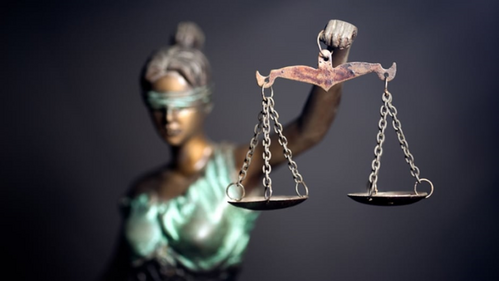Does god care about justice

pray
Lord, thank You for Your great compassion for me. Thank You for giving me the grace and mercy that I did not deserve. Give me Your heart for all people so that I don’t begrudge others the same opportunity to repent and be saved. I trust that someday, You will right all wrongs.
Amen.
Amen.
reveal
Share the joy that you have in Christ with someone who needs to hear the good news that their sorrow can be turned into rejoicing, too.
Read
Micah 8:8 (ESV)
“He has told you, O man, what is good; and what does the LORD require of you but to do justice, and to love kindness, and to walk humbly with your God?"
“He has told you, O man, what is good; and what does the LORD require of you but to do justice, and to love kindness, and to walk humbly with your God?"
Reflect
There is no doubt that the world is not as it should be. We see tragedy, corruption, and injustice every single day. Does God notice? Does He care? Will He ever do anything about it?
Every day, when I read the news, it’s more of the same. Another politician is accused of corruption or misconduct. Another report of a once trusted pastor abusing his congregants. More people in high places taking advantage of those beneath them. It really is sickening. It makes many of us wonder, does God care about the injustice in the world? And if He does, is He ever going to do anything about it?
The book of Micah was written during a time of serious injustice, around 735 – 710 B.C. Like Amos, Micah was a country boy called to prophecy for the Lord. In chapters 1-3, Micah exposed the sins of both Israel and Judah and predicted a coming judgment on both nations. The biggest issue that he condemned was the injustice of the powerful exploiting the weak. The rulers, the judges, the priests, and prophets were the people that God intended to lead, protect and guide His people. Instead, many of them took advantage of the people and abused their power for personal gain. Because of this, God would surely punish them.
Still, in the midst of his prophecy against them, Micah predicted that God would preserve a remnant of His people: “I will surely assemble all of you, O Jacob; I will gather the remnant of Israel; I will set them together like sheep in a fold, like a flock in its pasture, a noisy multitude of men. He who opens the breach goes up before them; they break through and pass the gate, going out by it. Their king passes on before them, the LORD at their head” (Micah 2:12-13).
But that isn’t the only clear Messianic prophecy in the book of Micah. In chapters 4-5, Micah moves on to an interlude of hope. Chapter 4 focuses on the promised restoration of Jerusalem and a great reversal. The nations who rose up against God’s people will one day be judged themselves. But it is in chapter 5, that I believe the Scarlet Thread of redemption shines the brightest. A new ruler is promised who will “shepherd his flock in the strength of the LORD, in the majesty of the name of the LORD his God. And they shall dwell secure, for now he shall be great to the ends of the earth. And he shall be their peace” (Micah 5:4-5).
Micah even clearly predicted the place where this new ruler would be born: “But you, O Bethlehem Ephrathah, who are too little to be among the clans of Judah, from you shall come forth from me one who is to be a ruler in Israel, whose coming forth is from of old, from ancient days” (Micah 5:2). This prophecy was of course already fulfilled in Jesus Christ, our Messiah. But we still wait expectantly for the fulfillment of Jesus returning to reign, be our shepherd, and be our peace.
Micah finished up his book with a courtroom motif in which the Lord brought an indictment against His people for breaking their covenant with Him. In chapter 6, He called creation as a witness of His faithfulness to His people. But the people were not faithful to Him. They were outwardly religious, but their hearts were far from Him. Their attitude towards their sin demonstrated in Micah 6:6-7 was that they would just offer extravagant sacrifices in order to go on sinning. But that is not what the Lord required.
“He has told you, O man, what is good; and what does the LORD require of you but to do justice, and to love kindness, and to walk humbly with your God?” (Micah 6:8). God didn’t want their empty sacrifices—He wanted their hearts. He wanted them to humbly obey Him as Lord and love other people the way that He does. He goes on to point out that because He is holy and just, He must judge them because they are guilty.
Friends, God does care about justice, and He does do something about the injustices of the world. Even better, He will do something permanent about the injustices of the world! He pointed out that the same God who judged His people will mercifully pardon them: “He does not retain his anger forever, because he delights in steadfast love. He will again have compassion on us; he will tread our iniquities underfoot. You will cast all our sins into the depths of the sea (Micah 7:18-19).rious joy, for you are receiving the end result of your faith, the salvation of your souls” (1 Peter 1:8-9).
Every day, when I read the news, it’s more of the same. Another politician is accused of corruption or misconduct. Another report of a once trusted pastor abusing his congregants. More people in high places taking advantage of those beneath them. It really is sickening. It makes many of us wonder, does God care about the injustice in the world? And if He does, is He ever going to do anything about it?
The book of Micah was written during a time of serious injustice, around 735 – 710 B.C. Like Amos, Micah was a country boy called to prophecy for the Lord. In chapters 1-3, Micah exposed the sins of both Israel and Judah and predicted a coming judgment on both nations. The biggest issue that he condemned was the injustice of the powerful exploiting the weak. The rulers, the judges, the priests, and prophets were the people that God intended to lead, protect and guide His people. Instead, many of them took advantage of the people and abused their power for personal gain. Because of this, God would surely punish them.
Still, in the midst of his prophecy against them, Micah predicted that God would preserve a remnant of His people: “I will surely assemble all of you, O Jacob; I will gather the remnant of Israel; I will set them together like sheep in a fold, like a flock in its pasture, a noisy multitude of men. He who opens the breach goes up before them; they break through and pass the gate, going out by it. Their king passes on before them, the LORD at their head” (Micah 2:12-13).
But that isn’t the only clear Messianic prophecy in the book of Micah. In chapters 4-5, Micah moves on to an interlude of hope. Chapter 4 focuses on the promised restoration of Jerusalem and a great reversal. The nations who rose up against God’s people will one day be judged themselves. But it is in chapter 5, that I believe the Scarlet Thread of redemption shines the brightest. A new ruler is promised who will “shepherd his flock in the strength of the LORD, in the majesty of the name of the LORD his God. And they shall dwell secure, for now he shall be great to the ends of the earth. And he shall be their peace” (Micah 5:4-5).
Micah even clearly predicted the place where this new ruler would be born: “But you, O Bethlehem Ephrathah, who are too little to be among the clans of Judah, from you shall come forth from me one who is to be a ruler in Israel, whose coming forth is from of old, from ancient days” (Micah 5:2). This prophecy was of course already fulfilled in Jesus Christ, our Messiah. But we still wait expectantly for the fulfillment of Jesus returning to reign, be our shepherd, and be our peace.
Micah finished up his book with a courtroom motif in which the Lord brought an indictment against His people for breaking their covenant with Him. In chapter 6, He called creation as a witness of His faithfulness to His people. But the people were not faithful to Him. They were outwardly religious, but their hearts were far from Him. Their attitude towards their sin demonstrated in Micah 6:6-7 was that they would just offer extravagant sacrifices in order to go on sinning. But that is not what the Lord required.
“He has told you, O man, what is good; and what does the LORD require of you but to do justice, and to love kindness, and to walk humbly with your God?” (Micah 6:8). God didn’t want their empty sacrifices—He wanted their hearts. He wanted them to humbly obey Him as Lord and love other people the way that He does. He goes on to point out that because He is holy and just, He must judge them because they are guilty.
Friends, God does care about justice, and He does do something about the injustices of the world. Even better, He will do something permanent about the injustices of the world! He pointed out that the same God who judged His people will mercifully pardon them: “He does not retain his anger forever, because he delights in steadfast love. He will again have compassion on us; he will tread our iniquities underfoot. You will cast all our sins into the depths of the sea (Micah 7:18-19).rious joy, for you are receiving the end result of your faith, the salvation of your souls” (1 Peter 1:8-9).
